|
|
|
Sort Order |
|
|
|
Items / Page
|
|
|
|
|
|
|
| Srl | Item |
| 1 |
ID:
132892
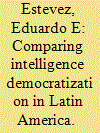

|
|
|
|
|
| Publication |
2014.
|
| Summary/Abstract |
This article aims to contribute to the understanding of the intelligence democratization process in new democracies comparing three South American countries: Ecuador, Peru, and Argentina. With a background of authoritarian legacies ('political police' style intelligence agencies controlled by the military) under particular political circumstances and changing strategic environments, these countries experienced disparate trajectories, prescriptions, and outcomes in their efforts to reform their intelligence communities. Drawing on new institutionalism, historical moments and relevant events shaping the dynamics of intelligence democratization are highlighted for each case, depicting failures and successes, and identifying drivers of change.
|
|
|
|
|
|
|
|
|
|
|
|
|
|
|
|
| 2 |
ID:
111180
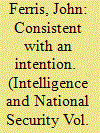

|
|
|
|
|
| Publication |
2012.
|
| Summary/Abstract |
From 1934, Britain expanded its military and naval intelligence agencies against Japan. At the outbreak of war in Europe, they, and most of their personnel, were moved from Hong Kong to Singapore, and joined into an interservice organization, the Far East Combined Bureau. Much of the evidence about the Far East Combined Bureau is lost, but the surviving record illustrates what intelligence was available to decision-makers in Singapore during 1940-41, thus illuminating every debate about this disaster. Even more: it enables a reconceptualization of the relationship between intelligence and the outbreak of the Pacific War as a whole.
|
|
|
|
|
|
|
|
|
|
|
|
|
|
|
|
| 3 |
ID:
138357


|
|
|
| 4 |
ID:
126441
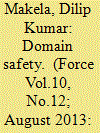

|
|
|
|
|
| Publication |
2012.
|
| Summary/Abstract |
The stage for the cyber war has already been set, albeit secretly. In the last two months, the revelations made by the US' ex-Central Intelligence Agency employee, Edward Snowden, in various interviews to The Guardian newspaper, revealed that the US' intelligence organisation, National Security Agency (which had launched the top-secret PRISM programme) was snooping on personal data of individuals and governments in the US and across the world through the internet. He also revealed that the National Security Agency (NSA) intercepted a big chunk of sensitive information that belongs to India by spying on the embassies and their diplomatic missions. And perhaps the most daunting revelation was that the information sharing between the intelligence agencies of various countries, such as the US and the UK, is already underway.
|
|
|
|
|
|
|
|
|
|
|
|
|
|
|
|
| 5 |
ID:
175089
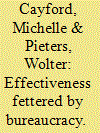

|
|
|
|
|
| Summary/Abstract |
The evaluation of the effectiveness of surveillance technology in intelligence agencies and oversight bodies is notably lacking. Assessments of surveillance technology concerning legal compliance, cost, and matters of privacy occupy a solid place, but effectiveness is rarely considered. Bureaucracy may explain this absence. Applying James Q. Wilson’s observations on bureaucracy reveals that effectiveness is minimally treated because it is more difficult to evaluate than budget assessments and legal compliance, and because intelligence outcomes are unobservable and difficult to oversee. Effectiveness evaluation is thus fettered by bureaucracy. Considerations of bringing in effectiveness assessment must appreciate the realities of bureaucratic constraints to be successful.
|
|
|
|
|
|
|
|
|
|
|
|
|
|
|
|
| 6 |
ID:
171250
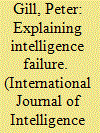

|
|
|
| 7 |
|
| 8 |
ID:
124118
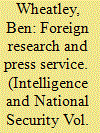

|
|
|
|
|
| Publication |
2013.
|
| Summary/Abstract |
The article investigates how the Foreign Research and Press Service succeeded in overcoming internal government prejudice to become His Majesty's Government primary supplier of intelligence from the German-occupied Baltic states during the Second World War. As the Foreign Office had banned the covert intelligence agencies from operating within the Soviet sphere, which included the Baltic states, the non-covert Foreign Research and Press Service Baltic States Section could operate without offending the USSR. The article charts how the Foreign Research and Press Service supplied crucial information from the enemy press that helped to form British war and post-war policy towards the USSR.
|
|
|
|
|
|
|
|
|
|
|
|
|
|
|
|
| 9 |
ID:
169007
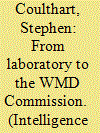

|
|
|
|
|
| Summary/Abstract |
Academic research can improve national security, yet the process by which findings flow from the ivory tower to intelligence agencies is not well understood by scholars. This article addresses this gap through an exploratory case study of when research impacted intelligence: the incorporation of cognitive biases research in intelligence analysis. The results of this study illustrate the importance of idea entrepreneurs—individuals who promote academic research—as well as the need for making academic findings applicable to intelligence practitioners. These results, while based on a single case, suggest new avenues for scholarship exploring knowledge utilization in intelligence.
|
|
|
|
|
|
|
|
|
|
|
|
|
|
|
|
| 10 |
ID:
116121
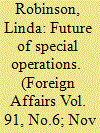

|
|
|
|
|
| Publication |
2012.
|
| Summary/Abstract |
Over the past decade, the United States' military and the country's national security strategy have come to rely on special operations to an unprecedented degree. As identifying and neutralizing terrorists and insurgents has become one of the Pentagon's most crucial tasks, special operations forces have honed their ability to conduct manhunts, adopting a new targeting system known as "find, fix, finish, exploit, analyze, and disseminate." They have adopted a flatter organizational structure and collaborated more closely with intelligence agencies, allowing special operations to move at "the speed of war," in the words of the retired army general Stanley McChrystal, the chief architect of the contemporary U.S. approach to counterterrorism.
|
|
|
|
|
|
|
|
|
|
|
|
|
|
|
|
| 11 |
ID:
151798
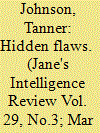

|
|
|
| 12 |
ID:
173192
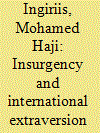

|
|
|
|
|
| Summary/Abstract |
This article examines the various deficiencies of the security agency of the Federal Government of Somalia in Mogadishu in terms of intelligence capacity, capability and competence to counter Harakaat Al-Shabaab Al-Mujaahiduun (hereafter Al-Shabaab), the militant movement fighting against the government and its external backers. Based on field-based oral and written research data in Mogadishu, the article argues that the heavy dependence of the government's National Intelligence and Security Agency (NISA) on various external patrons essentially makes the agency less efficient and effective than Al-Shabaab's intelligence agency, the Amniyat. Looking at the internal dynamics of the government and its rival insurgency movement offers fresh anthropological insights into how the Amniyat is more dynamic than the government's intelligence agency. In spite of its internal faults and failures, the Federal Government has become stuck in an externally-imposed security architecture envisioned by the so-called ‘partners’. This has made the NISA far behind the Amniyat in terms of security provision because both opposing security agencies pursue different methods to broadcast their power and presence. Delving deeper into the inner workings of the security institutions of the NISA and the Amniyat demonstrates that the performances and practices of the two intelligence agencies reflect the acute failure that inherently characterises the government security sector.
|
|
|
|
|
|
|
|
|
|
|
|
|
|
|
|
| 13 |
ID:
119411
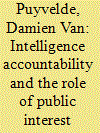

|
|
|
|
|
| Publication |
2013.
|
| Summary/Abstract |
This article explores the role of US public interest groups in the promotion of government transparency, as part of a broader agenda on civil liberties. Drawing on a set of declassified documents, and extensive oral testimony from protagonists, it is argued that such groups occupy a significant position as facilitators of intelligence accountability in the United States. Public interest groups represent a tradition of pluralism that lies at the heart of the American conception of democracy. A survey of the tactics deployed by interest groups to support liberal democratic principles demonstrates that these groups always rely on government institutions to carry out their oversight function. By virtue of this, public interest groups support intelligence accountability rather than hold to account the US government and its intelligence agencies.
|
|
|
|
|
|
|
|
|
|
|
|
|
|
|
|
| 14 |
ID:
095125
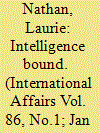

|
|
|
|
|
| Publication |
2010.
|
| Summary/Abstract |
This article explores the functions and impact of the South African constitution in relation to the country's intelligence services. The constitution has proved to be a powerful instrument for transforming, controlling and constraining the services, safeguarding human rights and contributing to the management of political conflicts and crises. Yet the constitution's relevance for the intelligence community is also contested and contradictory. Paradoxically, the executive, parliament and the intelligence services believe that it is legitimate for the services to deviate from constitutional provisions because their mandate to identify and counter threats to national security is intended to protect the constitution. The article contributes to filling a gap in the literature on security sector reform, which is concerned with democratic governance but ignores the role of a constitution in regulating the security organizations and determining the nature of their governance arrangements. Intelligence agencies around the world have special powers that permit them to operate with a high level of secrecy and acquire confidential information through the use of intrusive measures. Politicians and intelligence officers can abuse these powers to manipulate the political process, infringe the rights of citizens and subvert democracy. While a constitution cannot eliminate these risks, it can establish an overarching vision, a set of principles and rules and a range of mechanisms for promoting intelligence transformation and adherence to democratic norms.
|
|
|
|
|
|
|
|
|
|
|
|
|
|
|
|
| 15 |
ID:
119428


|
|
|
|
|
| Publication |
2013.
|
| Summary/Abstract |
Intelligence may have a bright future. Advances in imagery and signals processing technology mean that intelligence agencies can deliver remarkably accurate and timely intelligence to civilian officials and military commanders. However much leaders gripe about intelligence, few are likely to disregard such fine-grained information about threats and opportunities, especially when national security is on the line. Others contend that intelligence is central to the kind of wars that the United States is likely to fight in the foreseeable future. Counterterrorism, for example, depends on intelligence agencies to provide detailed descriptions of terrorist organizations, warning of impending attacks, and precise targeting information for offensive actions. U.S. counterterrorism operations will persist long after the country draws down from Afghanistan, because of the geographic expansion of groups associated with al-Qaeda, and because of the growing enthusiasm for special operations forces (SOF) and unmanned aerial vehicle (UAV) strikes against them. 1 Most importantly, policymakers have invested lavishly in intelligence for over a decade. President George W. Bush called for a large increase in the intelligence personnel in the wake of the 11 September 2001 (9/11) attacks on New York City and Washington, DC. Later, Congress created the Office of the Director of National Intelligence (ODNI), adding a new layer of bureaucracy above an already sprawling constellation of agencies. And, despite a great deal of criticism, the budget for intelligence has more than doubled since 9/11 and continues to rise.
|
|
|
|
|
|
|
|
|
|
|
|
|
|
|
|
| 16 |
ID:
149465
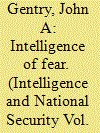

|
|
|
|
|
| Summary/Abstract |
Intelligence agencies long have brought unwelcome news to civilian political and military masters – and sometimes suffered severely for it. Even in Western democracies, insecurities and outright fear produce behavioral responses by individuals and defensive institutional reactions that distort normal intelligence activities and affect the overall performance of intelligence agencies. Causes of fear include: political leaders, overseers, agency managers, and the security elements of their organizations. This article highlights the importance of institutional factors, especially organizational cultures and incentives, on the activities and overall performance of intelligence agencies and suggests that motivated biases, caused by personal and organizational self-interest and fears, are more significant causes of intelligence failures than are commonly believed.
|
|
|
|
|
|
|
|
|
|
|
|
|
|
|
|
| 17 |
ID:
133353


|
|
|
|
|
| Publication |
2014.
|
| Summary/Abstract |
The two have traditionally had different relations with the top military leadership. Due to his family's military background, Khan always fancied himself as his party's natural choice for overseeing civil-military relations. Asif, on the other hand, has had a history of strongly opposing the role of the military and intelligence agencies in civilian politics
|
|
|
|
|
|
|
|
|
|
|
|
|
|
|
|
| 18 |
ID:
131045
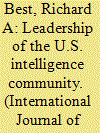

|
|
|
|
|
| Publication |
2014.
|
| Summary/Abstract |
Intelligence agencies exist to support government officials with information and analysis; unlike some academic institutions, they do not exist simply to promote the greater diffusion of knowledge. Intelligence officials serve a wide array of masters-Presidents, diplomats, policy planners, military commanders, and other government officials. In the United States, the need to support these diverse masters has brought into existence a complicated and cumbrous community of some seventeen organizations. 1 These agencies have been created over many years to describe and analyze the international environment and, ideally, give advance warning of imminent developments.
|
|
|
|
|
|
|
|
|
|
|
|
|
|
|
|
| 19 |
ID:
091237
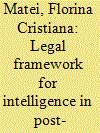

|
|
|
|
|
| Publication |
2009.
|
| Summary/Abstract |
A legal framework for intelligence delineates the rights, obligations, and powers of the intelligence organisations, as well as the arrangements for their governance and accountability, provides the intelligence system with guidance as to what it can and cannto do, indicates who is in charge and who oversees the activity of intelligence; insures that the intelligence apparatus is responsible before the law in case of abuses; makes sure that the IC benefits from legal protection if it observes the legally agreed guidance and directions.
|
|
|
|
|
|
|
|
|
|
|
|
|
|
|
|
| 20 |
ID:
130229
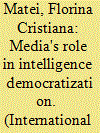

|
|
|
|
|
| Publication |
2014.
|
| Summary/Abstract |
In their path toward democratic consolidation, emerging democracies endeavor to ensure the democratic transfer of political power, bring changes in the legal framework, transform their executive, legislative, and judicial systems, boost free market economy, and develop robust and functional civil societies. They also institutionalize democratic civil-military relations (CMR) by establishing new security institutions-military, police, and intelligence agencies-that are under democratic civilian control, effective, and efficient. Of these many tasks, the democratization of intelligence agencies is by far the most daunting, as effectiveness and efficiency involve secrecy, while democratic control implies transparency, openness, and accountability. Nevertheless, democratic reform of intelligence in new democracies, though difficult, is not impossible, if and when civilians are interested and willing to "invest" in intelligence and intelligence reform. The contribution of external factors, such as media, 2 civil society, international groups, and individuals involved in human rights, may also be instrumental in achieving a balance between control and effectiveness of intelligence
|
|
|
|
|
|
|
|
|
|
|
|
|
|
|
|
|
|
|
|
|